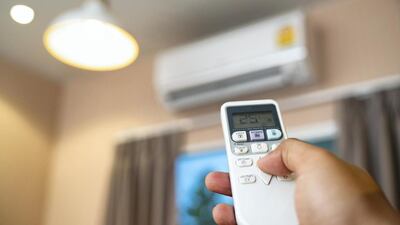The majority of UAE residents are unaware of the severe health implications of poor quality indoor air, a survey has found.
It has been described as a "ticking time bomb" that could lead to major illnesses such as heart disease and cancer.
Only 13 per cent of respondents thought air quality at home was an important factor in staying healthy, a YouGov survey of more than 1,000 people across the entire UAE found.
This was despite people spending more time than ever at home due to remote working arrangements introduced to curb the spread of Covid-19.
With the UAE's scorching summer now hitting and people spending even more time inside, experts urged residents to regularly clean their air conditioning units.
Failure to do so could cause headaches, dizziness and even serious diseases such as pneumonia
“We worry about what we can see, and indoor air pollution is an invisible threat,” said Sara Alsen, of air purification company Blueair, who commissioned the report.
“The impact of poor indoor air quality is a ticking time bomb, not just in the UAE, but to people all over the world."
Indoor air can be up to five times more unclean than outdoor air, studies have shown.
“One of the most alarming findings was that over 95 per cent of those we surveyed in the UAE believe that the risk of becoming infected by a virus or bacteria is greatest outside the home,” said Ms Alsen.

“Given the fact that we spend over 90 per cent of our time indoors, where the air is proven to be up to five times more polluted than outside, this is a surprising finding.”
The World Health Organisation said air quality, both indoor and outdoor, is one of the greatest threats to human health.
About 3.8 million people a year die prematurely from illnesses attributable to household air pollution caused by the inefficient use of solid fuels and kerosene for cooking, it said.
Cooking and cleaning create many pollutants, while other particles enter our homes through windows and ventilation systems.
Other problems include dust, bacteria and viruses, and particles released from perfumes, smoking and burning candles.
A leading UAE doctor said failure to properly maintain air conditioning units was one of the most common causes of poor air quality at home.
“These air conditioning systems then may fail to remove contaminants from occupied areas, including carbon dioxide and monoxide, tobacco smoke, moulds and bacteria, cleaning products, copy machines and printers, pesticides, and vehicle exhausts," said Dr Johny Avookkaran, internal medicine specialist at Aster Hospital, Qusais.
“Major outbreaks of pneumonia have also resulted from contaminated air conditioners.”
He said the short-term impact of being indoors in a poor air environment included irritation of the eyes, nose and throat, as well as headaches and dizziness.
“Other health effects may show up either years after exposure has occurred or only after long or repeated periods of exposure,” said Dr Avookkaran.
“These effects, which include some respiratory diseases, heart disease and cancer, can be severely debilitating or fatal.”
The YouGov poll, commissioned by Blueair, canvassed the opinions of 1,002 Emiratis and UAE residents from February 8 to 14 on issues surrounding the cleanliness of indoor air. Almost one in three respondents were from Abu Dhabi - 32 per cent - while 30 per cent were based in Dubai, with the rest from the remaining emirates.









